Why audit of PPP contracts by COA the next hurdle
Why audit of PPP contracts by COA the next hurdle
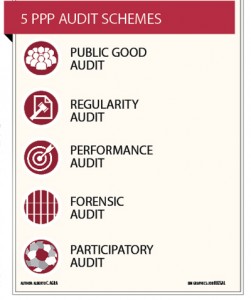 Why do some sectors say audit of public-private partnership (PPP) projects by the Com-mission on Audit (COA) is the next hurdle or challenge of awarded contracts? Why is a COA PPP Audit Guide (P3AG) a necessity? Do field auditors fully understand PPPs? What would be the harmful effects if field auditors have differing views on PPPs and varying interpretations of PPP contracts?
Why do some sectors say audit of public-private partnership (PPP) projects by the Com-mission on Audit (COA) is the next hurdle or challenge of awarded contracts? Why is a COA PPP Audit Guide (P3AG) a necessity? Do field auditors fully understand PPPs? What would be the harmful effects if field auditors have differing views on PPPs and varying interpretations of PPP contracts?
- Call for consistency. The absence of an official framework for audit of PPP projects and the comments by some that private funds may be subject to COA audit scare PPP stakeholders. Without a P3AG, COA Central officials and field auditors may make inconsistent and unsound audit findings.

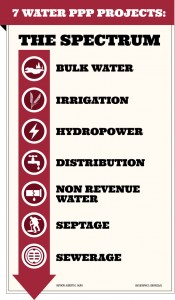 WHY is everyone into w
WHY is everyone into w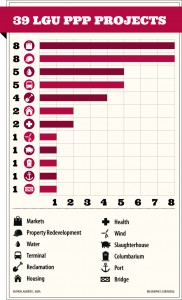 How much or how little do you know about public-private partnerships (PPPs) in the Philippines? Should PPPs be understood by ordinary citizens? Is there a broad learning ecology on PPPs? Do stakeholders have a common understanding of what a PPP is and what it is not?
How much or how little do you know about public-private partnerships (PPPs) in the Philippines? Should PPPs be understood by ordinary citizens? Is there a broad learning ecology on PPPs? Do stakeholders have a common understanding of what a PPP is and what it is not?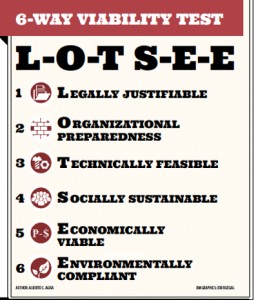 WHY the shift from a cautionary stance to an aggressive position? How come t
WHY the shift from a cautionary stance to an aggressive position? How come t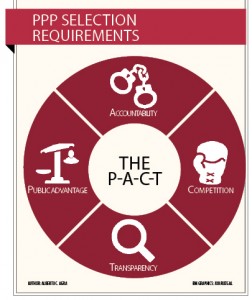 Are our government agencies ready for public-private partnership (PPP) arrangements? Do we have the right leaders, partners and followers? Do implementing agencies undertake PPPs just to join the bandwagon? Do all stakeholders understand what PPP is and what it is not? Do partners share the same vision and trust each other?
Are our government agencies ready for public-private partnership (PPP) arrangements? Do we have the right leaders, partners and followers? Do implementing agencies undertake PPPs just to join the bandwagon? Do all stakeholders understand what PPP is and what it is not? Do partners share the same vision and trust each other?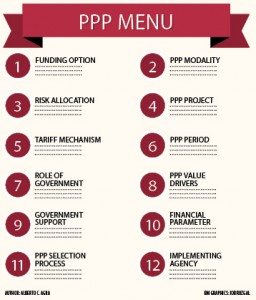 Why public-private partnership (PPP) for a road project and not procurement using public funds? Why do most local government units and water districts opt for joint ventures and not a build-operate-transfer scheme? Why will government assume the right-of-way risk and not the operations risk? Why use the lowest tariff, not the highest concession fee, as financial parameter for bulk-water supply project? Why bundle a reclamation project with land development and expressway, and why unbundle a radiology department from a PPP of the whole hospital? Why contribute the usufruct of government property and not cash in a PPP arrangement?
Why public-private partnership (PPP) for a road project and not procurement using public funds? Why do most local government units and water districts opt for joint ventures and not a build-operate-transfer scheme? Why will government assume the right-of-way risk and not the operations risk? Why use the lowest tariff, not the highest concession fee, as financial parameter for bulk-water supply project? Why bundle a reclamation project with land development and expressway, and why unbundle a radiology department from a PPP of the whole hospital? Why contribute the usufruct of government property and not cash in a PPP arrangement?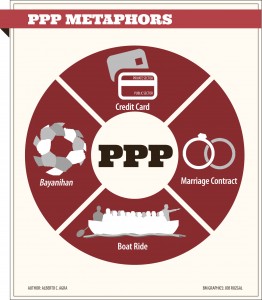 Simplifying a complex arrangement like a public-private partnership (PPP) is not a daunting task as it may seem. Using metaphors and comparing PPPs with common or day-to-day activities will definitely help in informing the public about this development strategy. Popularizing PPP de-monopolizes knowledge and facilitates the creation of a broad PPP learning ecology.
Simplifying a complex arrangement like a public-private partnership (PPP) is not a daunting task as it may seem. Using metaphors and comparing PPPs with common or day-to-day activities will definitely help in informing the public about this development strategy. Popularizing PPP de-monopolizes knowledge and facilitates the creation of a broad PPP learning ecology.